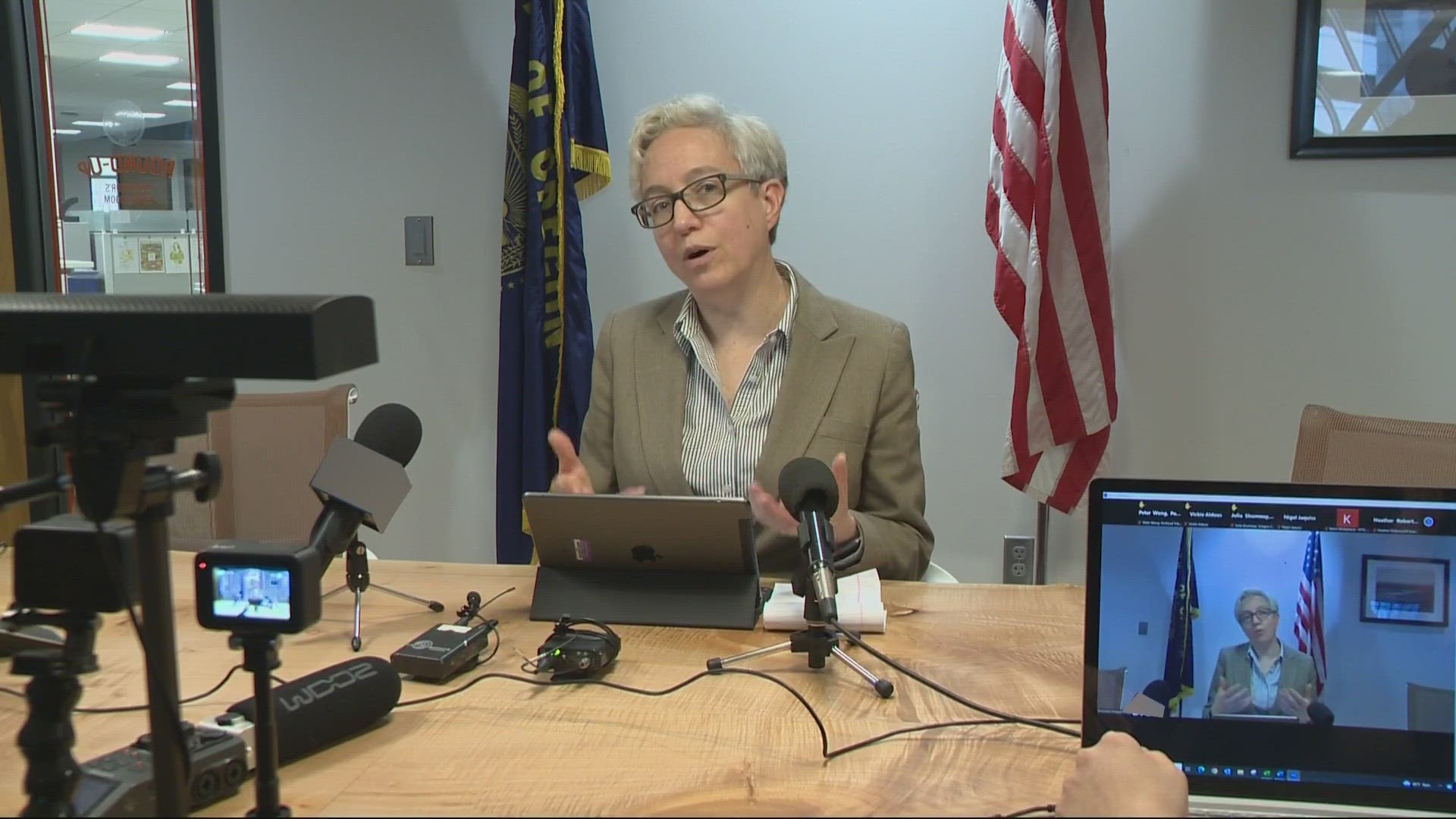SALEM, Ore. — Oregon Governor Tina Kotek announced specific funding allocations Monday for the seven regions covered by the homelessness state of emergency declaration that she signed shortly after taking office in January.
At the time, Kotek requested that the Oregon Legislature move quickly to pass an initial housing and homelessness package to fund the order. The legislature did so last month, passing a $200 package of legislation that included $85.2 million for local emergency plans.
About $79.2 million of that funding will be distributed in total, Kotek announced Monday, an amount based on multiple factors including the appropriation from the legislature and plans submitted by the local communities.
The Oregon Housing and Community Services Department will reserve half of the remaining $6 million "to ensure the goals of the emergency order are achieved," according to a news release from Kotek's office. The other half will be used for a statewide incentive program for landlords "participating in local rehousing efforts."
The recipient areas are grouped into seven geographic regions, most of which combine at least two cities or counties. The regions requested $98.8 million in total, so there wasn't enough to completely fulfill each region's funding request, Kotek's office said.
The allocations also include specific targets for rehousing and shelter beds as part of the emergency order's stated overall goal of rehousing more than 1,200 households statewide and creating more than 600 new shelter beds by the end of the year.
Here's the funding breakdown, according to Kotek's office:
- Portland/Gresham/Multnomah County: $18.2 million to rehouse 275 households and create 138 shelter beds
- Eugene/Springfield/Lane County: $15.5 million to rehouse 247 households and create 230 shelter beds
- Central Oregon: $13.9 million to rehouse 161 households and create 111 shelter beds
- Salem/Marion, Polk Counties: $10.4 million to rehouse 158 households and create 79 shelter beds
- Medford, Ashland/Jackson County: $8.8 million to rehouse 133 households and create 67 shelter beds
- Hillsboro/Beaverton/Washington County: $8.0 million to rehouse 121 households and create 61 shelter beds
- Clackamas County: $4.4 million to rehouse 130 households.
Another $33.6 million from the package, aimed at eviction protection for households at risk of becoming homeless, will be distributed statewide through existing programs. The legislation also sets aside $26 million to address homelessness in counties that do not qualify for the emergency order.
Kotek's emergency order only applies to parts of the state where the unsheltered homeless population has increased by 50% or more from 2017 to 2022, but there is a separate benchmark for counties that apply for access after initially failing to qualify. That's the route Clatsop County took to get added last month.
Calling out the Portland area
Multnomah county, Portland and Gresham will receive the most money, yet on Monday Governor Kotek expressed hesitancy around allocating that money to them due to what she described as a lack of collaboration between the city and county and missing details in their plans for how they would use it.
"In the case of Multnomah County and the city of Portland, I'll be honest, I was disappointed that they didn't have more clarity," Kotek said. "I've sat through several meetings about existing capacity, who's paying for what, where does the money come from, what's the city committed to, what's they county committed to... they need to get their stuff together...we need to see stronger collaboration and detail."
That advice contradicts what Portland Mayor Ted Wheeler said last week about the city and county partnership during a press conference announcing the new director of the Joint Office of Homeless Services.
"I can tell you that the relationship between the city and the county around homeless services is better than it has ever been," Wheeler said.
Wheeler's team shared a response to Kotek's statement in an email to KGW Monday afternoon:
"I agree with Governor Kotek that partnership and collaboration between city and county governments is critical to our mutual success. My team looks forward to reviewing both the submitted proposal and recent input from the Governor’s office. We will work in partnership with the Multnomah County-led Multi-Agency Coordinating (MAC) group on an updated revision. Both the City and the County are each responsible for different parts of an overall solution and we must show a clear strategy on how to best deliver those services with the allotted state emergency funding. I am very pleased with the strengthened relationship with Governor Kotek and Chair Vega Pederson. We will continue to meet regularly to collaborate on the most significant issues facing our city and state."
Multnomah county's spokesperson also sent KGW a response:
"Throughout this process, we’ve worked with the state to develop a responsive, smart plan for Portland, Gresham and Multnomah County that aligns with the vision set forth in the Governor’s Emergency Orders. With decision-making members from the County, the City of Portland and the City of Gresham, as well as service providers and local stakeholders, we are building a model for partnership that will carry us to the next stage of this work: delivering on what’s planned. We look forward to meeting with the Governor, her team, and the leadership at OHCS and OEM to ensure that we have a plan and path forward that delivers on the urgency of this momentum, the unprecedented funding from the state and our shared priorities."
Governor Kotek also noted that Clackamas County did not receive any money for additional shelter capacity, and she appeared to reference the county's recent abrupt reversal on a project to purchase a hotel to use as transitional housing. Kotek issued a statement condemning the decision after the county scuttled the project last month.
"When a community says we can hit 50-60 more shelter beds but yet is unable to site the one that they have, it does undermine confidence that they can hit that," Kotek said Monday.

